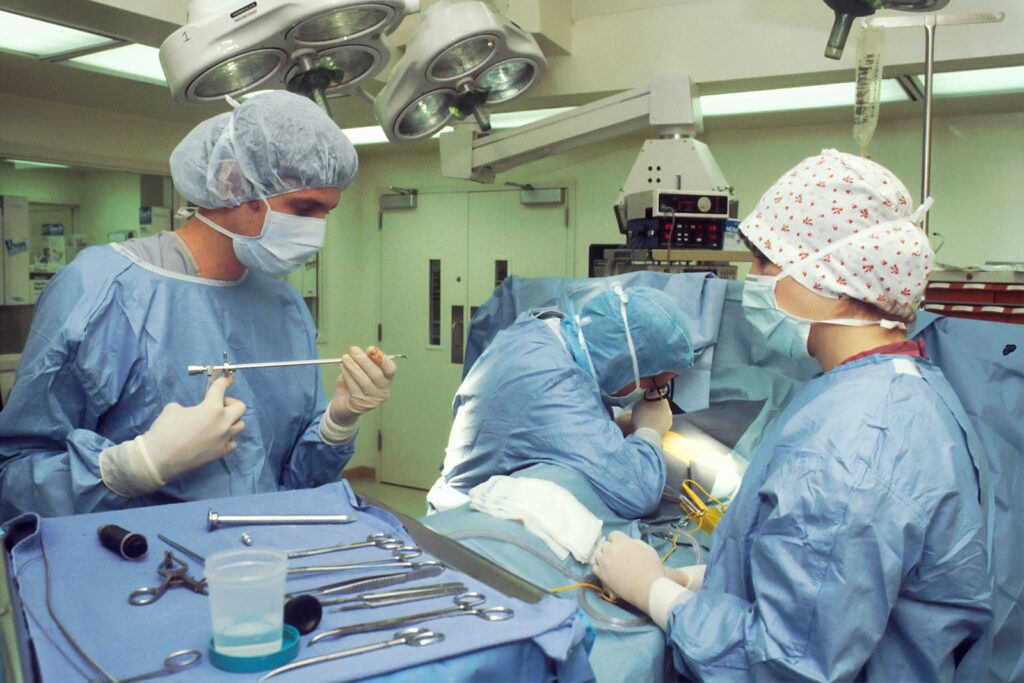If you are wondering what gastric sleeve surgery is, it is known as sleeve gastrectomy. It is a surgical procedure that involves removing a portion of the stomach to reduce its size and limit food intake. While this surgery can help individuals with obesity lose weight and improve their health, it is not without risks. In our previous blog, we wrote about Intermittent Fasting for Weight Loss: 6 Unexpected Truths. In this blog post, we will explore three blood-curdling tales of unbearable suffering experienced by gastric sleeve surgery patients and discuss how to avoid such complications.
Blood-Curdling Tales of Gastric Sleeve Surgery
 Anna’s Experience
Anna’s Experience
Anna, a 35-year-old mother of two, decided to undergo gastric sleeve surgery after struggling with her weight for years.
However, just a few days after the surgery, she began experiencing severe abdominal pain, vomiting, and diarrhea.
Anna was rushed to the hospital, where doctors discovered that her stomach had leaked due to a complication during the surgery.
Anna had to undergo emergency surgery to repair the damage and spent weeks recovering in the hospital.
John’s Experience
John, a 45-year-old man, underwent gastric sleeve surgery to improve his health.
However, he developed a post-surgery infection that required multiple hospitalizations and additional surgeries.
John had to take several months off from work and experienced significant financial and emotional distress.
Sarah’s Experience
Sarah, a 28-year-old woman, had gastric sleeve surgery and experienced severe hair loss and malnutrition after the procedure.
Despite following the recommended dietary guidelines, Sarah struggled to consume enough nutrients to support her body’s needs.
She had to take several supplements and make significant changes to her diet to address her deficiencies.
It’s important to understand what gastric sleeve surgery entails and the potential risks involved before making a decision.
Consulting with a qualified healthcare provider is recommended to determine if the surgery is a suitable option.
Causes of Gastric Sleeve Surgery Complications
 If you’re considering gastric sleeve surgery, it’s essential to understand the potential complications that can arise.
If you’re considering gastric sleeve surgery, it’s essential to understand the potential complications that can arise.
Lack of thorough research and preparation, inadequate medical expertise, and failure to adhere to post-surgery instructions are common causes of complications.
That’s why it’s crucial to do your due diligence, choose an experienced and qualified surgeon, and strictly follow your post-surgery instructions.
By doing so, you can help minimize the risks and ensure a successful outcome.
If you’re wondering what gastric sleeve surgery is and whether it’s right for you, consult with a trusted healthcare professional who can guide you through the process.
How to Avoid Gastric Sleeve Surgery Complications
 If you’re considering weight loss surgery, such as gastric sleeve surgery, it’s important to take steps to avoid complications.
If you’re considering weight loss surgery, such as gastric sleeve surgery, it’s important to take steps to avoid complications.
One of the most crucial steps is to thoroughly research the surgery and its potential benefits, risks, and complications.
Additionally, it’s essential to choose a qualified and experienced surgeon who can perform the surgery safely.
Following your surgeon’s post-surgery instructions is also crucial for a smooth recovery and to avoid any complications.
Some of the common post-surgery instructions include dietary changes, regular exercise, and follow-up appointments with your surgeon.
By taking these steps, patients can reduce the risk of complications and achieve successful weight loss results.
So, if you’re wondering what gastric sleeve surgery is, make sure to do your research and follow your surgeon’s instructions closely.
Preparing for Gastric Sleeve Surgery
 If you’re considering what gastric sleeve surgery entails, there are some steps to prepare for a successful outcome.
If you’re considering what gastric sleeve surgery entails, there are some steps to prepare for a successful outcome.
To start, consult with a doctor to determine if gastric sleeve surgery is the best option for your needs and to receive guidance throughout the process.
Additionally, mental preparation is crucial as this surgery can significantly change your life.
You may want to consider speaking with a therapist or joining a support group for individuals who have undergone the procedure.
Pre-surgery dietary and exercise recommendations are also important to follow, which your doctor will likely provide.
This may include changes such as reducing caloric intake, increasing physical activity, and quitting smoking.
Taking these steps before the surgery can help ensure a positive outcome and a successful weight loss journey.
The Gastric Sleeve Surgery Procedure
 If you’re considering weight loss surgery, you may be wondering what gastric sleeve surgery involves.
If you’re considering weight loss surgery, you may be wondering what gastric sleeve surgery involves.
The procedure is a common type of bariatric surgery that involves removing a large portion of the stomach to create a smaller, sleeve-shaped stomach.
During the procedure, the patient is put under anesthesia and the surgeon makes small incisions to access the stomach.
Using a laparoscope, the surgeon removes a large portion of the stomach and seals the remaining portion using surgical staples.
While gastric sleeve surgery can be an effective way to lose weight, it does come with risks and potential side effects, such as nausea, vomiting, pain, bleeding, infection, blood clots, and stomach leakage.
Be sure to discuss all the risks and benefits with your doctor before deciding if this surgery is right for you.
Remember, what gastric sleeve surgery involves may not be suitable for everyone.
Recovery from Gastric Sleeve Surgery
 If you’re considering weight loss surgery, it’s important to know what gastric sleeve surgery entails.
If you’re considering weight loss surgery, it’s important to know what gastric sleeve surgery entails.
Recovery from gastric sleeve surgery can take time and patience, and it’s important to follow your doctor’s instructions closely.
Post-surgery care typically includes dietary recommendations to allow your stomach to heal properly.
You may need to start with liquids before gradually introducing soft and solid foods. Your doctor may also recommend light exercise, like walking, as you recover.
Strenuous activity should be avoided until your doctor clears you.
Pain and discomfort are common after gastric sleeve surgery, but your doctor can provide pain management options.
Recovery time varies for each patient, but it’s important to follow all post-surgery instructions for the best outcome.
Understanding what gastric sleeve surgery involves and preparing for recovery can help you make an informed decision about weight loss surgery.
Conclusion
If you’re wondering what gastric sleeve surgery is and whether it’s the right weight loss solution for you, it’s essential to conduct thorough research and seek guidance from a qualified healthcare professional.
Gastric sleeve surgery is a significant procedure that involves removing a portion of the stomach to reduce its size and promote weight loss.
While it can be an effective weight loss tool for individuals struggling with obesity, it’s crucial to approach the surgery with careful consideration and preparation to avoid complications.
Choosing a qualified surgeon, understanding the risks and benefits, and following all post-surgery instructions can help increase the chances of a successful outcome.
Remember that gastric sleeve surgery is not a quick fix and requires a lifelong commitment to healthy habits, including diet and exercise.
By seeking the right guidance and support, gastric sleeve surgery can be a valuable tool in achieving a healthier, happier life.
Are you tired of hearing blood-curdling tales of unbearable suffering associated with gastric sleeve surgery?
If so, there's a better way to achieve your weight loss goals without subjecting yourself to drastic measures.
Introducing PrimaJust—a revolutionary weight loss method that promises all-natural results and doesn't require any dieting or exercise!
The daunting realities of gastric sleeve surgery might have left you questioning its suitability for your own weight loss journey.
But fear not, because PrimaJust is here to offer you a safe and effective alternative.
By downloading our still free report, you'll discover The Exact Method to Unlock Your Metabolism for All-Natural Weight Loss, enabling you to shed 1-3 pounds per week effortlessly.
Say goodbye to extreme measures and embrace a healthier, happier you today!
Don't miss this chance—get your hands on our exclusive report and start your transformative journey with PrimaJust now.
[Source]Free Report
Looking to lose weight effortlessly? Click here to schedule your free Weight Loss Clarity Call today, while it’s still available.
Achieve a new level of enlightenment with these essential related blog posts
-
Lap Band Surgery: 9 Hidden Dangers to Know Before Weight Loss
Lap band surgery, also known as gastric banding, is a popular surgical procedure used to…
-
Saxenda for Weight Loss Scams: Beware of the Risks
Saxenda is a prescription medication used to treat obesity as a glucagon-like peptide-1 (GLP-1) receptor…













